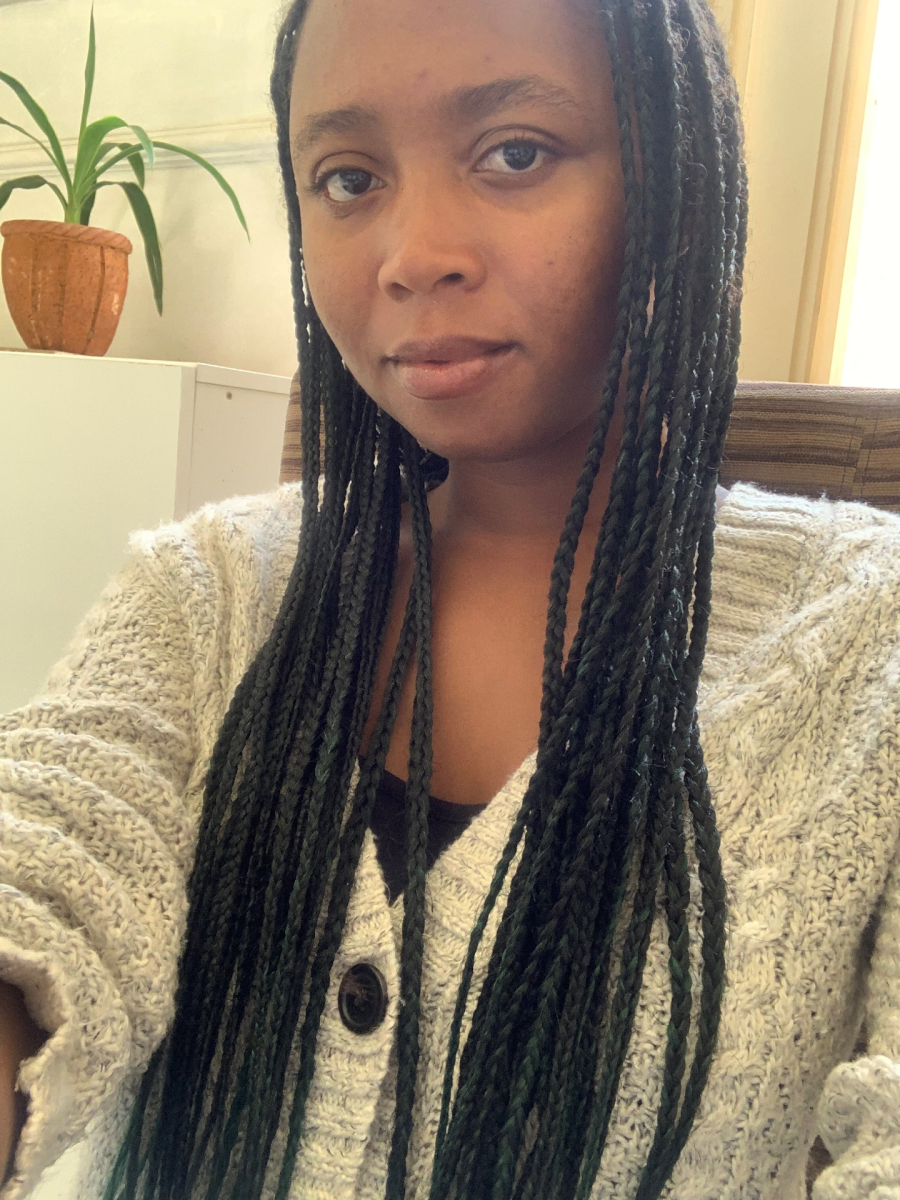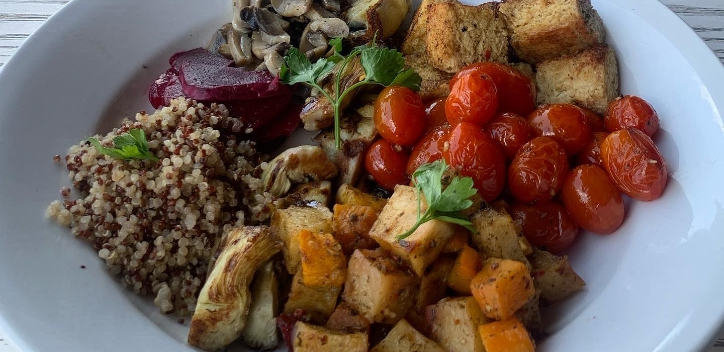Vegan Society Volunteer, Zuleka Waldman, shares her experience of going vegan in Zimbabwe
I made the mistake of deciding to stop eating meat right before Christmas. I was basically walking myself into temptation city because in Zimbabwe, Christmas is meat. Christmas is about the many different types of meat you can fit on a plate. With lots of different salads drenched in mayonnaise. It's grandly known as 7 Colours and is basically a rainbow of food on a plate, with the staples being rice, chicken and salad, and dessert always having custard, jelly and cake. The women would spend the whole day cooking and end it exhausted, or cook everything the night before and spend Christmas day relaxing in front of the TV or with family and friends as the latest music from around the world played loudly and everybody wore fancy outfits. At home, we had an open dishing system with big pots of food so everyone could grab a plate and dish mountains for themselves throughout the day and eat to their heart's content. In some families, the men would stand in front of a braai (a barbecue or grill) looking after the meat while the women made dishes such as rice, macaroni and cheese, and sadza (a thick porridge), as well as salads. The fancier folk however, would have a 10 tray buffet. So when I went vegetarian, I forsook half of that. And when I went vegan the following year, I basically forsook all of it. It was hard, but I was done with meat and nothing could tempt me back. Not even my favourite time of the year.

I went vegan knowing that there were plant-based alternatives out there, I just didn’t think they existed in Zimbabwe. A few days before Christmas, I magically wandered into the only supermarket in town that had vegan alternatives. So that Christmas I had vegan sausages and salads. I made my own 7 Colours and I was happy to be eating sausages without feeling the intense guilt eating meat had begun to give me before I decided to stop. I then spent a year as a vegetarian and I felt like the good person I thought I was. This was until I came across a vegan documentary that highlighted animal exploitation and opened my eyes to the reality of the animal agriculture industry I was still supporting with my purchase of dairy and egg products.
I became fully vegan that instant and while being vegetarian made eating out hard, being vegan in Zimbabwe made things impossible. I stopped eating out. I stopped attending work and family functions. I only ate food I cooked for myself at home. I baked muffins a bunch of different ways until I figured out that self-raising cake flour was the best for not having a rubbery texture, and that the vegan versions could also rise and be as fluffy and as soft as regular bakes. I watched YouTube videos and took their instructions step by step until I turned dough into seitan. I found soy beans for $1.50 at a local store and graduated from buying 1 litre of $5 soy milk to making it myself for way less. I discovered mushrooms and fell in love when I deep fried them. And after years of not eating out, I went on a mission to find at least one vegan menu item at the restaurants in my city. My first find was a vegan burger at a fast-food chain. It tasted very boring, almost like plain samp (marble-sized balls of boiled maize) with sauces poured over it and placed in a bun. But I was happy to have finally found something. I then discovered a local Chinese restaurant and they had over 50 menu items, with about 10 of them being vegan. Pure joy. This was my first time trying out tofu, and I always go back for it. That and glass noodles. I also found my favourite vegan burger (with cheese swapped out for barbeque sauce) and the best chips in the city, for just $3.50. Amazing.
In my professional life however, I had a wide range of experiences. One of the companies I worked with had a birthday celebration tradition which included a cake being purchased for every staff member’s birthday. We would pray for more years to be added to their lives and sing happy birthday, and I probably watched over 20 cakes eaten in front of me before I decided to stop attending. At another company, they were gracious enough to order the plainest but kindest vegan muffins so I could join in. And at another company, we all headed to a local hotel for a three-course lunch. When I asked about vegan options, they suggested I have a salad. As I began traveling a lot for work, I realised plain chips were my friend. Expensive hotels and restaurants are also clueless so spending more money didn’t help but suggesting mushrooms and micromanaging the chef did. Otherwise I had to deal with being given fruit to have with tea, or stir-fried cabbage with a side of boiled butternut. The latter was very odd, even to my non-vegan colleagues who consoled me and laughed about the ridiculous combination. I eventually started researching the cities I was visiting and giving the catering staff the contacts of shops selling vegan alternatives so I could eat decent meals. This helped a lot.

When I wasn’t traveling, I thought packing my own lunches for work events would help me feel less left out. I did it once and looked at the ten trays I couldn’t touch and I felt my heart sink because they knew I was vegan but they kept leaving me out. They would apologize and encourage me to remind them because they claimed to have forgotten. I had reminded them multiple times before. One time they asked me to come collect my food and I was handed a chicken dish that I couldn’t touch, making me look rude. Another time, I was given a burger and raw meat barbecue voucher at a work event. When I tried to explain that having no vegan option means I often go hungry at these long work events, I was told that talking about food is culturally rude and not lady-like, so I should just smile and accept what I am given or donate the meals like the two permanent staff members who also don’t eat meat and have worked there for decades do. This was when that superior began asking my supervisor when my contract would be ending. I watched my values clash with my income, and that amount of power over me made me feel incredibly small. That must have been the day I started seeking out volunteer opportunities with vegan organisations. It was getting too dark for me and I needed to connect with people who got it instead of always feeling difficult and smiling through discrimination. When I found The Vegan Society and applied for a volunteer role, I felt like I had found my escape. Every task I would get made me smile and I would think to myself, “This is my dream, I can’t believe I get to do this.” I get to work on The Vegan Society web pages and update their written and visual content so more people can find them, and so they can have a fresher feel. Outside of technical work, I also got to write a review for The Vegan, and this fulfilled my lifelong dream of writing for a magazine. My volunteer work quickly became my very necessary escape that I honestly might have gone mad without. I felt like I could finally breathe, and that I could talk about veganism in a workspace that didn’t penalise me for it.
If you have faced similar challenges or any kind of discrimination, I highly recommend The Vegan Society’s advocacy service. I wish I had known about this when I was facing these issues because although I felt powerless, there were a lot more options than I was aware of. You can contact the team by emailing knowyourights[at]vegansociety[dot]com, or find more information on the What rights do vegans have? webpage.
Anyway, back to the story. In addition to volunteering with The Vegan Society, I also began to volunteer with local organisations so I could help change the current climate. After a workshop about hen welfare, I watched people get up and head to a buffet that had roasted chicken, so I don’t really know why they bothered to be honest. That level of dissociation was baffling to me. At that same event, I spoke to someone who said they trained people on plant-based cooking. I asked how that was possible as I had seen them eating meat during the break. It became clear that this was a big reason why veganism isn’t making much traction in Zimbabwe. If those who are meant to make the change use grant money to buy meat during breaks, it becomes evidence of a system too broken to work, and that is why it is barely working.
Instead of feeling down on my luck and powerless, I am empowered by celebrations such as Black History Month, which takes place in October. It is a great reminder of people who had seemingly impossible societal goals, and who eventually achieved them. It is a reminder that movements against even the most dominant social norms can be won, as was the case with slavery, apartheid, and more. Animal welfare and veganism may not be mainstream right now, but we are in good company, and I cannot wait until we finally have a world where kindness and compassion to all animals is not weird but embraced as the norm.

Zuleka Waldman is a Zimbabwean psychology student who volunteers for vegan organisations such as The Vegan Society, and is transitioning into an animal advocacy career.
The views expressed by our bloggers are not necessarily the views of The Vegan Society.

